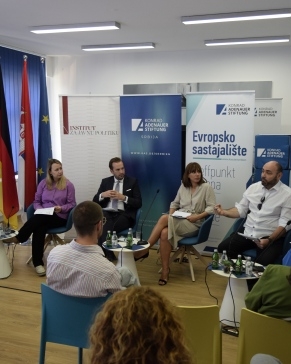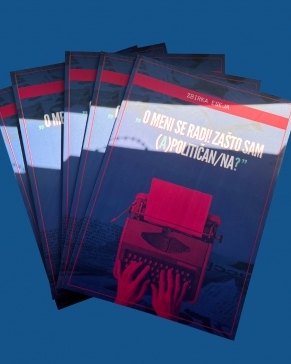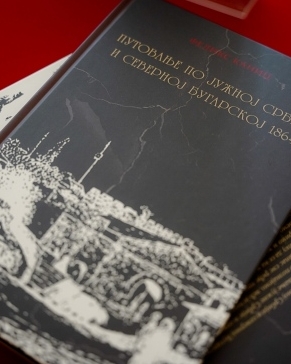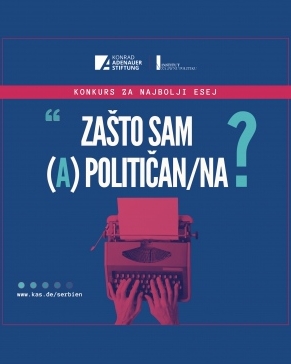
The past may sometimes seem dark, almost unknowable. Historical experiences are sometimes trying to adapt to the incoming era, but the future is constantly uncertain, primarily due to the inability of history in producing a predictable regularity, laws, even tendencies. There are opinions that the history is renounced any role in this regard. Slow progress in culture, mentality, and constancy of climate, however, reveals patterns of behaviour, thinking and feeling. The unity of the local space, origin, customs and everyday life illuminates the past and the future that are intertwined in the content, meanings and messages. The Balkans are a symbol of mutual antagonism, in individual attitudes and collective mood, the network of myths that are the similar if not even common. Myths are the contents of identity, the driving force of emotion, passion, sometimes well-founded decisions, almost tangible. Their concrete historical background is irrelevant, sometimes undesirable.
It is probably not the Balkans, or Serbian, excellence, as the past and the future are considered very rare and special. Here, nations and individuals here have always a special mission. The collective failure, however, is usually explained by conspiracy of powerful, national disunity, betrayal, and bad fate. Myths are the richness and uniqueness of every collective culture, but can also produce, while in service, in use, disappointments and frustration. One of the clear definitions of this space is precisely the sense of important differences in the mutual relations with the European modern culture that myths, if not the prejudices, mostly housed in the past. In periods that, since, at least temporarily, do not impose challenges in international relations, the Balkans are gradually falling into oblivion, remaining neglected as the symbol of unpleasant experiences and patterns of misconduct.
Serbian history has remained, in a sense, the personification of the Balkans, although that history did not take place only in South-eastern Europe. Its emigration is important as well. Important are its perceptions, the views on Serbian reality from the side. The meanings of the Balkans, and also the individual Balkan communities, at first only geographical terms, have been transformed into one of the most derogatory moral and political labels. In particular, the Byzantine "triumph of barbarism and religion" (E. Gibbon) was becoming a synonymous to the European notions of the entire Southeast. The Balkans is the first "Third" world in the nineteenth century, and, probably, in contemporary events, the last major area of European integration. Over the Balkans, as a paradigm, still hangs the shadow of prejudice, including our own, internal ethnic and racial hate, political collectivism and pseudo-religions.
The past is important, as it is commonly imagined, in everyday life, in popular culture, and that’s not a local Balkan speciality. Nations and chosen individuals are in a very special historical mission. However, the Serbian history discontinuities stem from the lack of permanent communities able to preserve and develop the institutions, meaning a written and directed culture of memory. We need a socio-cultural history to investigate the movement of human communities in between civilizations, in their peripherals. Islamization and Europeanization never completed throughout the Western Balkans. It is not possible to determine an ethnic, racial continuity that would remain in all congruent with the state and culture. Weak links with the cultural capitals generated, in the Balkan communities, a mythology of distant ethnic origin and racial purity, though their origins are not clear, and lost in a distant pre-modern past.
Serbian history cannot be considered beyond its actual historical framework that included general systems of European and World history, and there is nothing exceptional in that. In that history and its interpretations, no matter whether they are scientific, there are no absolute boundaries between present and past, and between past and its reflections. Borders, dividing, internally, the same peoples and their communities, have not always been real. They are sometimes mythical, sometimes imposed with violence.
The failure of the last authentic state structures of the feudal society, and the dramatic changes that have taken place during the fifteenth century, probably produced by a deep collective trauma, but there is no sufficient knowledge about that. Such experience was transferred to the later periods, mostly through the oral tradition, suffering the ideological and emotional distortion. It is difficult to determine the pre-modern identities, as the only collective institution was the church, and society non-Christianized, in a vague state of Christian propaganda and the existing layers of paganism, superstition and heresy. Identification of the church with the nation and the state also is a creation of the later time. Migrations were taking place in very special circumstances, strengthening the myth of the Limes, the border that cuts people in half. Images of Limes are actually descended from fiction about the legacy of the Roman Empire, from pointing out the barbarism from the other side of the border, and civilization, although the first forms of the Western feudal states emerged exactly from the barbarian tribal communities, and their drowning into the late Roman institutions and society. So the myths have been tied to the characters and events, whose historical importance has not been of the first class, but their significance was lately acquired particularly through the traditions and interpretations often deprived of their historical basis, such as the Kosovo myth or memory of Prince Marko, becoming a traditional cultural substance. Preservation and development of myths, and, in parallel, rational memory, literacy, and later the Enlightenment, the national idea, occurred in, paradoxically, on the other side of the Limes, meaning on the wrong side, in territories which have gradually mastered the Habsburgs, and in the Dubrovnik Republic. That space was further expanded. In fact the modern process of Europeanization was taking place outside the premises which, since 1804, became the scene of the first national-liberation revolution based on the Enlightenment and the previous major European upheaval, and the core of the first modern Serbian state.
Views of South-eastern Europe are faced with aspirations that are not recognized, and such further examined, internal, mutual similarities, patterns, related processes. But the past is not as it is commonly imagined, in everyday life, in popular culture. Local, genuine Balkan histories do not provide enough continuity, or experience, to suit modern needs. Balkan dualism of good and evil is not simple at all, and is not sufficiently explored. Further, the Balkans, as a term, as a notion, has often been considered as amalgam whose individual components are not clear, nor important. There are assumptions, also based in reality that the lines of internal, mutual separation, does not extend along the very lines of essential differences, or absolute contradiction. Each individual history of the Balkan community is just one of the paradigms, which sometimes means mutual suspicion and hate. Such features are in some sense passed on to the overall ratio of the Balkans with the outside world. And mutual feelings are delivered to the paradigm of the joint vessels. This does not mean that each community has failed to keep its authentic features. European rationalism was showing a specific lack of patience, good will, in needs of understanding the local paradox, so that such a wealth of history has sometimes been contemptuously rejected. The truth is, ass well, that the Balkans are and better understood, when viewed from outside. Little value that the Europeans were giving to the Balkans, with the exception of the ancient layers, among the Balkans have been accepted as insulting, and biased or tied to an inability to understand the delicate local phenomenon and internal differences, or the prospects for such a thought were to be applied only to those "other", the neighbouring community, "substantially", "fundamentally" different.
European culture was using the Balkans also as a dump of its worst political ideas, after being dismissed as becoming redundant, or beginning to resemble an embarrassing, unacceptable past. In traditional European perspective, the Balkans is a dark den of servitude.
The Balkan nationalisms are rather the symptoms of mentality, than of a clear identity. Such identities have been composed of underlining differences, and feelings of vulnerability.
Serbian nationalism was first accomplished European nationalism of the nineteenth century. During the twentieth century the Serbian nationalism has been dynamically transformed through the integrative Yugoslav idea, but finally ended as one of unfulfilled European nationalisms at the beginning of the XXI century. There are other opinions; these are phenomena which are quite complicated. But there is not a need, any more, in taking in consideration a historical distance, in the “history of the present”. The Yugoslav disintegration process, violent and tragic, was also specific as the first “real time”, CNN-type war chronicle, along with the Gulf war in Iraq.
The curse of collectivism and mutual intolerance were depriving the Balkan nations of strength and development energy. This curse reduced the common individual to an insignificant shadow, obscuring from the history, and from the future, "ordinary", "small" people, their daily lives, their concrete time, and their sense of time. In this sense, the fiction writers went ahead of history, interpreting the past. History and her research in this area are too often victims of accident.
There is a tendency to interpret the problems of history, its temptations, in terms of special and comparative advantages. Serbian culture considered itself as a crossroad of major routes and lines of tectonic split of civilizations. Observed form the other, Western point of view, the Balkan mentality was perceived as less valuable, slow, insidious, and harmful. And so did the local writers, representing the realistic streams in national literature. Serbia was slowed, in development and modernization, by its provincial territorial status, rural structures, small peasant property and a modest, lonely, confused mentality, and political philosophy of palanka, small provincial city. And that’s maybe why every exceptional performance in Serbian history is owed or to the terrible loss of life, or to talented individuals, instead to the system of developed institutions.
The Balkans have been often divided, in self-examination, and self-realization, between the beliefs of a grim survival on the margins, the distant, lonely border, on the outskirts of civilization, and, also, in thought that their space is a key arena of European history. European politics and culture have particularly neglected the Balkans during their periodic withdrawal in taking care about, both, their past and their future. Their identities have been associated with prejudices. Balkans has been ignored even as the concentration of the absurd, the paradox and aporias, which also give meaning to history. History otherwise is not built on genetics of human and social rationalism. In traditional Balkan perspective, both the past and the future are only corresponding phases of the past. Mythologized past is not fully understood. Collective imaginations are usually expressions of real social conditions. Every Balkan nation is trying to restore the territory related to the period of the real, or even imagined, peak of strength and expansion. Wars are lead also with use of onomastic, toponymy, with all forms of identity. These identities are considered millennial, transposing the national community to the ancient, thousand-year history. Historical mythology, otherwise a fiction, also really exists, and its strength is immense. The Serbian Kosovo is based on collective beliefs in past and the future, and Albanian Kosovo with the raw, exclusive ethnic reality, and so on. The Balkan nations emerged from a myriad of ingredients, yet there is, maybe, nowhere such an exclusive narcissism when it comes to beliefs in ethnic excellence, past and purity.
The Balkan communities have remained in deep shadows of contemporary general histories considered as fast, prone to deliberation and change, based on a business venture, diplomacy, or prominent personalities. The Balkans mainly remained in their slow and hidden realities in rural areas, along roadsides, or in rare, small towns. Even a calendar year has a double face. Winter's ice is an obstacle to the movement and activities, but also separating and calming the enemy. And the summer powered the wheel of history.
A human day to day reality is all about the concern in certainty, in surety, in stability. Lifestyle was leaving a very rare, scarce testimony. Now is an interesting history topic. Traditional society that remained in the dualism of the drama of great events, retained, and eventually fostered, social layers which transcended archaic discipline and adjusting to new circumstances. In the depths of the Balkans was held to an almost forgotten civilization that, keeping the memory of feudal times and overcome the patriarchal tradition, sought to, bridge the reality in which she was neglected. An intimate history of the Western Balkans, in certain areas, calls to take the path that was tread down in literature, in fiction. The everyday life of the feudal society could be, similarly, reached by the subsequent plunge in "intermediate" times, corresponding to the European early modern, remaining recorded in verbal memory. Finally and deeply establishment of Ottoman rule was creating, among the Christians, and even the local Muslims, a tragic sense of hopelessness and loneliness. Only the frequency of international policy related to the destiny of the Ottoman Empire, which almost irresistibly reminded of a previous, Byzantine, even in the characteristics otherwise considered as the antipodes, has revived some of the internal forces of this world that has languished in various forms of hibernation, or demographic and economic collapsing, stretching up, migrating, or returning, in thoughts, to the past that, as such, never existed.
Current collapses of time, spatial and cultural borders is obviously pushing the processes of cultural de-marginalization and de-provincialization. In the Balkans, a counter of rationalism and post-colonial domestic "provincial" xenophobia already has taken place. After this encounter, the Balkans, as it may seem, have become less intriguing, partly due to the disappearance of the conflicts that have marked the last decade of the twentieth century. The current crisis of Western civilization, particularly its security system and economy, has challenged the traditional appeal of European space which, for the Balkans, implied as a domain of opening, freedom and progress. Second decade of the XXI century announce anxiety, anticipation, the new unknown. And if history is confirmed by the present, and although on both sides, on the Balkans and the side of European civilization, have been developed institutional capacities that allow the fast and progressive change of reality, this movement may remain in the shadow of global changes, which may require new adjustments.
Balkan exceptionalism, hidden in the collective beliefs, should not be an obstacle to the placement of the Balkans in the context of macro-history. The paradigm of the Balkan system of connected vessels is already disputing the local, traditional beliefs in self-uniqueness, special features, or an important historical trajectory. But just recognizing this paradigm, indicates that the Balkans, on the whole, remain interesting and revealing even in enlightenment of their historical failures, from the modern European historical perspective: the failure of the Balkan communities to develop relatively free and developing urban civilization, the failure to establish a direct communication with the Renaissance, and also with Reformation, rationalism , Enlightenment, secularism, modern urban revolutions and technological civilization. The processes indicating the efforts in compensating this lag also remain very important.
Balkan collectivism has ignored the role of the individual, often lonely, as an actor of the past. And even when as such being recognized, the individual is mainly seen in optics of hero or antihero. The reality of the individual relations with the outside world, imagined, seen and experienced through the mysterious and unreal forces, is probably an outstanding re-challenge. One of these experiences is reduced to the culture of memory, thus the interpretation and production of history and tradition. The local communities have shown a tendency to remember and cherish the basic movement of history as the cult of personality, of apologetics or a myth. Distortion of history in its interpretation is resulting even in approaches that call for positive knowledge and scientific method: nationalism, racism, socialism, pacifism, feminism, political correctness, and political incorrectness. History becomes an instrument of politics, philosophy and religion, and there is nothing new in that.
The cavity of civilization, one of the Balkan paradigms, reveals a very interesting structure of human impulses and their role in history. Man is crueler than any other animal species. That cruelty is defining him both in the biological world and in social life. One of the important human drivers is sex. Abduction of women, including polygamous male character, sometimes explains aggression and destruction. Almost of equal importance is the occupation of water sources. The need for sugar, basically unhealthy narcotic that supports human activity and high spirits, motivated the occupation of the American continent, and was almost equal to the importance of gold and silver. Man has developed a culture of killing, torture, sadism, and cultural restraint. Gathered and managed by primary instinct, until the invention of rational secular state and its institutions, the human communities have relied on the principles of military social organization. Plunging in the depth of human nature is usually painful, but is very important as a long-term experience, which follows.
Civilizations are basically imposed systems of teleological belief in the background of the same systems of value, order and culture. European civilization is the first and the only in history, that has matured in doubt, sometimes in open, conscious self-denial. Renaissance disputed scholastic, impersonal authorities in arts and literature, the Reformation the belief based on hierarchy, rationalism disputed theology applied to the world of physics, the Enlightenment began to eradicate illiteracy, technological revolution removed the material backwardness, rural urbanization susceptibility to the masters, and the narrow-mindedness. Balkan history, which took place on the margins of such processes, is interesting in terms of their impact in general terms that were, in comparison with European, very special.
History requires a huge research effort, exceptional energy and creativity. History is reanimating the past that is already dead. The history is the graveyard of personalities, cities, states, civilizations. In the long-vanished social relations history is implanting a new order that, at that time, never existed as such. People are equal or nearly equal in nature, but not in history, and especially not in historical interpretation. Their position also depends on the places that were given in the sources. A historical memory only applies to small particles of the past that remains, in its total entirety, especially in everyday life, unknowable.
Past research relates to the ability and the range of objective historical knowledge. Deconstructionists believe that it is impossible to analyze and recognize the past phenomena in terms of their real meaning and identity. As the firm connection between the past and the future remains just a historical method. Interpretation of history, in this sense, is the construction of the present. It is impossible to achieve the ideal that calls for a credible reconstruction. The only exception is the history of the present. Thanks to advances in technology and communication, and democratization of the media and public administration, even in the most rigid systems of the last two decades, the reference to the historical distance has become meaningless and superfluous. History has lost a traditional domain of exclusivity, as not remaining closed, locked in its own time. This will further enable the history to challenge the contemporary systems of knowledge. But, simultaneously, history became also burdened with the ethics of direct responsibility in its relations with contemporaries.
Are still important the facts? Historical knowledge is not based on clear, direct experience, written in the testimonies. Reflection on the past brings additional uncertainty. History as a process, in general and detail, has some kind of identity. Interpretation of history became one of the layers of the present, and part of the contemporary past’s identity. Identities are often vague, broad, and awkward. If the identities of non-historical communities, if indeed there are human groups "without history", such societies remain deprived of such an identity in relation to the past, in domain of memory and interpretation. Changes, transformations, questioning, doubt, are the features of historical identity. Restoring, same, moving in a circle or along the spiral paths of myths, and myths are partly anti or non-historical, at least in their direct messages for the future.
The Balkans anthropology is rich and unjustly neglected. Its basic human history is a slow, imbued with emotions, rituals, both with boredom and the dangers of everyday life. Balkan history is made of, at least, a dualism of thought and behaviour patterns. History is filled with incidents that are also considered as quite normal phenomena which human conceptualization is unable to resist. Therefore, the historical truth is so layered. If the facts, the testimonies, are acceptable in context of their authentic culture, the truth becomes the outcome of local value systems and the rationalization of reality. The facts are based on categorization. History deals with facts, their relations with other facts, and terms of their interpretation. Objectivity arises from the comparison of conflicting interpretations of the system related to the same events. The basis of this comparison is in the circumstances where historians agree about the accuracy, the credibility, of the most of the facts that continue to allow the establishment of separate, individual views.
The Serbian past history in the context of macro-history contains at least two interesting aspects. One refers to the forms that, according to the system of joint vessels, link as the whole the Western Balkan community, is justifying a general approach, regardless of the internal cultural and political differences, the boundaries and distinctions, real and imagined. There are, however, deviations from the regional patterns and trends, especially in those areas of European history that could have been in direct touched with South-eastern Europe. It may be overly simplifying the path that points to search for phenomena that are factors of the common destiny in space that has been too long been shrouded in darkness of the curse, or the species, which are basic characteristics of all history, because the whole history consists of unique events and personalities.
For past and the future of Southeast Europe are most useful, probably, the instructions that differ from the local patterns of thought. One is the way to the facts that are, in their basic masses, unknowable, and forever left in the past. Such a method is still the primary, regardless of the theoretical systems that point to further historical reflection. The history and facts of modern technological civilization, which is rational regardless of the ideological premises of politics, political, religion, economy and culture, no longer allow the primary, strict empiricism, or, on the other side, the outdated and sterile, scholastic debate about the "spirit" of history or historical "discourse" . As the attempts to apply the knowledge of the past to the future, in attempts of its predicting, are just as unsuccessful, and methodologically and ethically corrupt. Ideologically neutral framework that remains is reduced to a rational examination of systemic mechanisms, trends, patterns and trends. The philosophy of history is increasingly turning to solving practical problems of development, national or global. But, at that level of thinking, the warnings of K. Popper have a special sense, remaining even more convincing after all attempts to challenge his clear and precise postures: that it is impossible to reach the general historical theory by inductive generalizing, drawing in particular the laws and rules in history, especially the ruling mechanisms of the physical world. Access to the past is sometimes rational in their irrationality. Examination of the long historical currents that reveal the aspirations of the displacement of large structures such as economics, demography, material culture, technology, and understanding of freedom of conscience, will and individual, sometimes comes from the simple need in further understand of the contemporaries.




